Organizing Committee Members - NANO DRUG DELIVERY - 2022
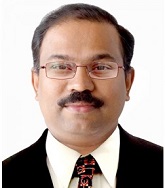
Vasdevan Pillai BIJU
Professor
Director, International Cooperation Promotion Office for International Alliance Hokkaido University
Japan
Vasdevan Pillai BIJU(Biography)
Prof. Vasudevan Pillai BIJU works as a professor at Laboratory of Molecular Photonics, Division of Material and Molecular Sciences, Research Institute for Electronic Science, Hokkaido University, Japan. He also works as a visiting professor at Nagoya University, Japan and Mahatma Gandhi University, India. He is a senior scientist at Health Research Institute, National Institute of Advanced Industrial Science & Technology (AIST), Japan and a Research Scientist at Health Technology Research Center, National Institute of Advanced Industrial Science & Technology (AIST), Japan.
Vasdevan Pillai BIJU(Research Area)
Vasudevan Pillai BIJU’s research interests focus on Creation of novel nanomaterials for photonics, Bio-Nano Interface, Optical manipulation of nanomaterials using laser tweezers, Chemical routes to photo-active nanoscale materials, Preparation of fluorescent nanomaterials and photo-functional molecules, Optical control of biomolecular functioning in cells, Control of charge carrier dynamics and fluorescence blinking in nanomaterials.
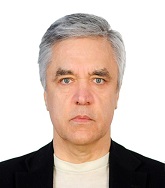
Sergey Suchkov
Professor
Moscow State Medical University
Germany
Sergey Suchkov(Biography)
Sergey Suchkov, MD, PhD was born in 11.01.1957, a researcher-immunologist, a clinician, graduated from Astrakhan State Medical University, Russia, in 1980.Suchkov has been trained at the Institute for Medical Enzymology, The USSR Academy of Medical Sciences,National Center for Immunology (Russia), NIH, Bethesda, USA) and British Society for Immunology to cover 4 British university facilities. Since 2005, Dr Suchkov has been working as Faculty Professor of I.M. Sechenov First Moscow State Medical University and Of A.I.Evdokimov Moscow State Medical & Dental University. From 2007, Suchkov is the First Vice-President and Dean of the School of PPPM Politics and Management of the University of World Politics and Law. In 1991-1995, Dr Suchkov was a Scientific Secretary-in-Chief of the Editorial Board of the International Journal“Biomedical Science†(Russian Academy of Sciences and Royal Society of Chemistry, UK) and The International Publishing Bureau at the Presidium of the Russian Academy of Sciences. In 1995-2005, Suchkov was a Director of the Russian-American Program in Immunology of the Eye Diseases.Dr Suchkov is a member of EPMA (European Association of Predictive, Preventive and Personalized Medicine,Brussels-Bonn), a member of the NY Academy of Sciences, a member of the Editorial Boards for Open Journal of Immunology and others. Dr Suchkov is known as an author of the Concept of post-infectious clinical and immunological syndrome, co-author of a concept of abzymes and their impact into the pathogenesis of autuimmunity conditions, and as one of the pioneers in promoting the Concept of PPPM into a practical branch of health services.
Sergey Suchkov(Research Area)
Sergey Suchkov’s research interests include Predictive, Preventive and Personalized Medicine, Immunology, Medicine, Pathology, Cell Biology, Biotechnology, Cancer Research, Clinical Immunology, Nanobiotechnology, Endocrinology, General Practice.
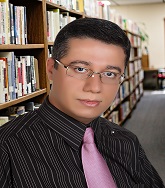
Alireza Heidari
Distinguished Professor
California South University
USA
Alireza Heidari(Biography)
Prof. Dr. Alireza Heidari, Ph.D., D.Sc. is a Full Distinguished Professor and Academic Tenure of Chemistry at California South University (CSU), Irvine, California, USA. He has got his Ph.D. and D.Sc. degrees from California South University (CSU), Irvine, California, USA. Furthermore, he has double postdocs in Project Management, Oncology, Human Cancer Tissues and Synchrotron Radiation from Monash University, Melbourne, Victoria, Australia and also in Nanochemistry and Modern Molecular Electronic–Structure Computations Theory from California South University (CSU), Irvine, California, USA. His research interests include Biophysical Chemistry, Biomolecular Spectroscopy, Quantum Chemistry, Nanochemistry, Modern Electronic Structure Computations, Theoretical Chemistry, Mathematical Chemistry, Computational Chemistry, Vibrational Spectroscopy, Molecular Modelling, Ab initio & Density Functional Methods, Molecular Structure, Biochemistry, Molecular Simulation, Pharmaceutical Chemistry, Medicinal Chemistry, Oncology, Synchrotron Radiation, Synchrocyclotron Radiation, LASER, Anti–Cancer Nano Drugs, Nano Drugs Delivery, ATR–FTIR Spectroscopy, Raman Spectroscopy, Intelligent Molecules, Molecular Dynamics, Biosensors, Biomarkers, Molecular Diagnostics, Numerical Chemistry, Nucleic Acids, DNA/RNA Monitoring, DNA/RNA Hypermethylation & Hypomethylation, Human Cancer Tissues, Human Cancer Cells, Tumors, Cancer Tissues, Cancer Cells, etc. He has participated at more than four hundreds reputed international conferences, seminars, congresses, symposiums and forums around the world as yet. Also, he possesses many published articles in Science Citation Index (SCI)/International Scientific Indexing (ISI), Medline/PubMed and Scopus Journals. It should be noted that he has visited many universities or scientific and academic research institutes in different countries such as United States, United Kingdom, Canada, Australia, New Zealand, Scotland, Ireland, Netherlands, Belgium, Denmark, Greece, Russia, Estonia, Ukraine, Turkey, France, Swiss, Germany, Sweden, Norway, Italy, Austria, Czech Republic, Hungary, Poland, South Africa, Egypt, Brazil, Spain, Portugal, Mexico, Japan, Singapore, Malaysia, Indonesia, Thailand, Taiwan, Hong Kong, South Korea, China, India, Qatar, United Arab Emirates, etc. as research fellow, sabbatical and volunteer researcher or visitor and so on heretofore. He has a history of several years of teaching for college students and various disciplines and trends in different universities. Moreover, he has been a senior advisor in various industry and factories. He is expert in many computer programs and programming languages. Hitherto, he has authored more than twenty books and book chapters in different fields of Chemistry. Syne, he has been awarded more than one thousand reputed international awards, prizes, scholarships and honors. Heretofore, he has multiple editorial duties in many reputed international and peer–reviewed journals, books and publishers. Hitherward, he is a member of more than four hundreds reputed international academic–scientific–research institutes around the world. It should be noted that he is currently the President of American International Standards Institute (AISI), Irvine, California, USA and also Director of the BioSpectroscopy Core Research Laboratory at California South University (CSU), Irvine, California, USA.
Alireza Heidari(Research Area)
Prof. Dr. Alireza Heidari's research interests include Biophysical Chemistry, Biomolecular Spectroscopy, Quantum Chemistry, Nanochemistry, Modern, Electronic, Structure,Computations, Theoretical Chemistry, Mathematical Chemistry, Computational Chemistry, Vibrational Spectroscopy, Molecular Modelling, Ab initio & Density Functional Methods, Molecular Structure, Biochemistry, Molecular Simulation, Pharmaceutical Chemistry, Medicinal Chemistry, Oncology, Synchrotron Radiation, Synchrocyclotron Radiation, LASER, Anti–Cancer Nano Drugs, Nano Drugs Delivery, ATR–FTIR Spectroscopy, Raman Spectroscopy, Intelligent Molecules , Molecular Dynamics, Biosensors, Biomarkers, Molecular Diagnostics, Numerical Chemistry, Nucleic Acids, DNA/RNA Monitoring, DNA/RNA Hypermethylation & Hypomethylation, Human Cancer Tissues, Human Cancer Cells, Tumors, Cancer Tissues, Cancer Cells
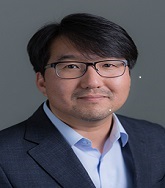
Seungpyo Hong
Professor
Director, Wisconsin Center for NanoBioSystems University of Wisconsin
USA
Seungpyo Hong(Biography)
Dr. Seungpyo Hong is Professor of Pharmaceutics in the Pharmaceutical Sciences Division and Director of Wisconsin Center for NanoBioSystems (WisCNano), School of Pharmacy at the University of Wisconsin-Madison (UW-Madison). He also holds an appointment as Adjunct Professor in the Colleges of Pharmacy at the University of Illinois at Chicago (UIC) and at Yonsei University, Seoul, Korea, along with serving as Associate Editor for Nanomedicine: Nanotechnology, Biology and Medicine of Elsevier.
Seungpyo Hong(Research Area)
Dr. Hong’s research focus lies at the interface of materials science, biology and nanotechnology to develop novel polymeric nanodevices for biological analysis, diagnostics and therapeutics. The ultimate goal of our laboratory is to achieve marriage of biomimetics and nanotechnology.
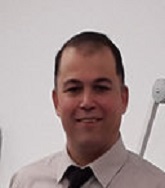
Mohammad Najlah
Deputy Head of School of Allied Health
Anglia Ruskin University
UK
Mohammad Najlah(Biography)
Mohammad is a multidisciplinary pharmaceutical scientist with excellent experience of Pharmaceutical Higher Education as a teacher, researcher and strategic manager. Mohammad joined the academic staff at the Faculty of Pharmacy, Al-Baath University where he took on senior roles including Acting Head of Pharmaceutics, Vice Dean for Students and Administrative Affairs until the end of 2013. Since joining Anglia Ruskin University, Mohammad has been instrumental in developing the Super Labs Complex including the New Nano Tech Lab and the establishment of new undergraduate and postgraduate programs.
Mohammad Najlah(Research Area)
Mohammad's research interests focus on Formulating nano-carrier delivery systems for targeting cancer stem cells, Polymeric prodrugs/conjugates and polymeric nano-particulates, Engineering novel nanomaterials for pharmaceutical and biomedical applications, Colloidal formulations (aerosols, nanoemulsions and nanodispersions), Clinical pharmaceutics, Bioequivalence and in vivo/in vitro correlations.
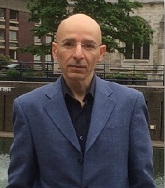
Dimitris Drikakis
Professor
School of Sciences and Engineering University of Nicosia
Cyprus
Dimitris Drikakis(Biography)
Professor Dimitris Drikakis is the Vice President for Global Partnerships at the University of Nicosia, Cyprus, and has a joint professor’s appointment in the School of Sciences and Engineering, and Medical School. Prior to that, he held academic and executive posts as Professor, Executive Dean, and Head of Department at various UK universities over a period of 24 years.
Dimitris Drikakis(Research Area)
His research is multidisciplinary and covers topics of fluid dynamics, nanotechnology, computational science, acoustics, and artificial intelligence. His work aims to address the reduction of uncertainty through a better understanding of computational science methods and the development of physics-based models, as well as the impact of emerging technologies on society and economy. To date, he has co-authored two books and published 400 journal and conference papers. He has graduated 45 PhD students who now hold positions in academia and industries (engineering, computing, finance) worldwide.
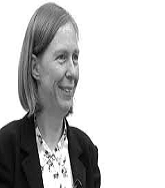
Yvonne Perrie
Professor
University of Strathclyde
UK
Yvonne Perrie(Biography)
In 1998, I gained my PhD from the University of London investigating the role of liposomes for drug delivery. I then moved to a newly established Drug Delivery Company (Lipoxen Technologies Ltd) for two years, developing their liposome drug delivery platform technology prior to moving to Academia to set up my own research group. I joined Aston University in 2000 and was appoint to Chair in Drug Delivery in 2007. I have effectively delivered in various academic and motivational leadership roles including Associate Dean for Learning and Teaching, Director of the Medicines Research Unit, and Head of Pharmacy. In 2016, I moved to the University of Strathclyde at part of their Global Talent Appointment Programme where I am continuing to develop my research strategies. My research and academic leadership has been recognised in a range of fellowships and awards including membership of the Controlled Release Society College of Fellows (2015), Fellow of the Royal Pharmaceutical Society (2014), Fellow of the Royal Society of Biology (2012), Eminent Fellow of the Academy of Pharmaceutical Sciences (2012), the Royal Pharmaceutical Society Pharmaceutical Scientist of the Year (2012), the British Science Festival Collaboration in Formulation Award (2011) and the Royal Pharmaceutical Society Science Conference Medal (2007). I maintain a steady funding stream to support my research team and I am funded through a range of sources including Government Research Councils, European Framework Funding, Industrial Partners and Charities (>£3.5 million in research funding). I have supervised 22 PhD students to successful completion (< 4 years), all of whom are now further developing their careers in either Academic or Industrial positions. Externally I have numerous strategic leadership and advisory roles: I am an expert advisor for the MHRA, Chair of Pharmacy Schools Council (Jan 2014-2017) and I am Editor of the Controlled Release Society Newsletter (2004 – present). Previously I have been a Director-at-Large for the Controlled Release Society (3 years) and I completed 2 terms (6 years) as the Chair for the UK and Ireland Controlled Release Society. I am Editor in Chief of the Journal of Liposome Research and Pharmaceutics and Associate Editor for the Journal of Drug Targeting and the Journal of Pharmacy and Pharmacology.
Yvonne Perrie(Research Area)
My research is multi-disciplinary and is focused on the development of drug delivery systems to facilitate the delivery of drugs and vaccines, thus providing practical solutions for current healthcare problems. I am an internationally recognised researcher with a strong track-record of high impact publications (current h-index 30), with approximately 100 peer reviewed manuscripts and 5 textbooks. To ensure the effective knowledge exchange and application of my research, I have generated 5 patents.

Rangel Vazquez
Professor
Technological Institute of Aguascalientes
Mexico
Rangel Vazquez(Biography)
Rangel Vazquez is a professor research at Technological Institute of Aguascalientes (ITA) in the Department of Metal-mechanical in the Materials Engineering program. I have served as a reviewer for several journals: Journal of Applied Polymer Science, Materials Letters, Carbohydrate Polymers, Thermochimica Acta, Journal of Molecular Structure, Journal of Surface and Coatings Technology, World Journal of Engineering and Physical Sciences (WJEPS), Annual Research & Review in Biology, Journal of Applied Physical Science International and International Journal of Nanomedicine. I have worked in the Organizing of International congress such as: 2016 Spring World Congress on Engineering and Technologies, 2nd Conference International of Surface and Interface on Materials; The 2nd Int'l Conference on Biomaterials and Applications, The 3rd Int'l Conference on Surface and Interface of Materials. I am on the Editorial Board of several journals I am Editor In Chief of BAOJ Pharmaceutical Sciences and the Journal of Pharmaceutics & Drug Development, respectively.
Rangel Vazquez(Research Area)
Nanotechnology applied to controlled drug delivery systems. In particular, skin and brain cancer, diabetes mellitus, antifungical, Design and preparation of oral solid (tablets and capsules) dosage forms, Analysis of drugs in pure forms, formulations and biological matrices, Bioadhesive drug delivery systems, especially hydrogels, polymers, biopolymers and IPNs, respectively.
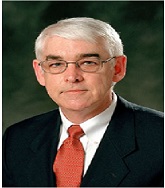
Robert K. Prudhomme
Director and Professor
Princeton University
USA
Robert K. Prudhomme(Biography)
I am a professor in the Department of Chemical and Biological Engineering, and founding director of the Engineering Biology Program at Princeton University. I received my BS at Stanford University and my PhD from the University of Wisconsin at Madison under Professor Bob Bird in l978. I have served on the executive committees of the American Institute of Chemical Engineers Materials Science Division and the U.S. Society of Rheology. Currently I am the past President of the U.S. Society of Rheology. I have served as the chair of the Technical Advisory Board for Material Science Research for Dow Chemical Company, which directed Dow’s materials research programs, I was on BASF’s nanotechnology advisory committee, and I served on the Board of Directors of Rheometric Scientific Inc., which was the leading manufacturer of rheological instrumentation. My awards include the NSF Presidential Young Investigator Award, Princeton School of Engineering and Applied Science Outstanding Teaching Award, the Sydney Ross Lectureship at RPI, the Bird,Stewart and Lightfoot Lecturer at the University of Wisconsin, and the Midland Macromolecular Institute Visiting Professor in Midland Michigan, and the Dinesh Shah lecturer at the University of Florida. I have been the organizer and Chair of the Gordon Conference on Ion Containing Polymers, and the Society of Petroleum Engineers Forum on Stimulation Fluid Rheology, in addition to organizing numerous sessions at AIChE, ACS, and SOR meetings. I directed the Princeton-University of Minnesota-Iowa State NSF NIRT Center on nanoparticle formation. My research interests include rheology and self-assembly of complex fluids. Systems of interest are biopolymer solutions and gels, surfactant mesophases, and polymer/surfactant mixtures. The goals of the studies are to understand how weak molecular-level interactions can be used to tune macroscopic bulk properties and phase behavior. Application of the work is directed at nanoparticle formation for the drug delivery, controlled release, targeting, and imaging.
Robert K. Prudhomme(Research Area)
My research interests include rheology and self-assembly of complex fluids. Systems of interest are biopolymer solutions and gels, surfactant mesophases, and polymer/surfactant mixtures. The goals of the studies are to understand how weak molecular-level interactions can be used to tune macroscopic bulk properties and phase behavior. Application of the work is directed at nanoparticle formation for the drug delivery, controlled release, targeting, and imaging.
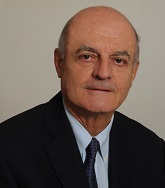
Jean-Michel Scherrmann
Dean and Professor
Paris Descartes University
France
Jean-Michel Scherrmann(Biography)
Jean-Michel Scherrmann, Pharm. D., Ph. D. is Professor in the Department of Pharmacokinetics, Faculty of Pharmacy, the University Paris Descartes. He has been recently promoted Dean of the Faculty of Pharmacy at University Paris Descartes and nominated Professor at the National Institute of Nuclear Sciences and Techniques.He received his Pharm.D. and Ph. D. in analytical radiochemistry from the University Descartes at Paris. He has led the Neuropsychopharmacology Unit at the French Institute of Health and Medical Research (INSERM) and the National Center of Scientific Research (CNRS) from 2002 to 2013. He has mentored over 30 postgraduate and 44 doctoral students. Dr. Scherrmann has been a recipient of the 1992 Americal Academy of Clinical Toxicology Award and the 1999 French National Academy of Medicine Achievement Award. He is a Fellow of the American Association of Pharmaceutical Scientists and a member of the French National Academy of Pharmacy. He was visiting Professor at Tohoku University (Japan) Graduate School of Pharmaceutical Sciences in 2008 and awarded as Honoured Member of the French Metabolism and Pharmacokinetics Group in 2014.
Jean-Michel Scherrmann(Research Area)
Dr. Scherrmann has made significant contributions to the development of drug radioimmunoassay, drug detoxification by immunotherapy and drug redistribution concepts in pharmacokinetics. He pioneered the first clinical application of colchicine immunotherapy in acute colchicine overdoses and is now focusing his research on the role of drug transporters in neuropharmacokinetics and on drug delivery strategies to the brain. His work has resulted in two patents, 290 scientific articles, 35 books chapters and more than 250 invited presentations. He has served on the editorial boards of several journals in the analytical and pharmaceutical sciences.
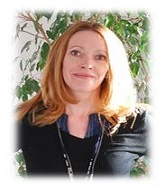
Nadine Millot
Professor
University of Bourgogne
France
Nadine Millot(Biography)
Nadine Millot is a Professor at the University of Bourgogne (Dijon, France). She is the principal investigator and founder of the "BH2N (Bio-)hybrid nanoparticles & nanostructures" group in the Nanosciences Department of the Institut Carnot de Bourgogne. Her group has extensive expertise in the field of synthesis and characterization of nanoparticles, particularly SPIONs used as bimodal contrast agents, and titanate nanotubes developed for the nanovectorisation of active molecules. Nadine Millot is the author of more than 60 peer reviewed publications, 1 patent, 2 book chapters, 1 educational book (Ed. Lavoisier). She has also given 30 invited oral presentations in the last five years and has supervised 11 PhD students.
Nadine Millot(Research Area)
Innovative nanoparticles for biomedical applications, SuperParamagnetic Iron Oxide Nanoparticles, Titanate nanotubes, Soft chemistry, Hydrothermal Synthesis, Nanohybrids, Functionalization, Biocompatibility, Vectorization, Theranostic, Possible toxicity of these nanoparticles through the deployment of innovative biotests: internalization, cytotoxicity, genotoxicity, carcinogenicity, ecotoxicity (Zebrafish model), biodistribution (MRI, TEP/CT, optical imaging, bimodal contrast agents).